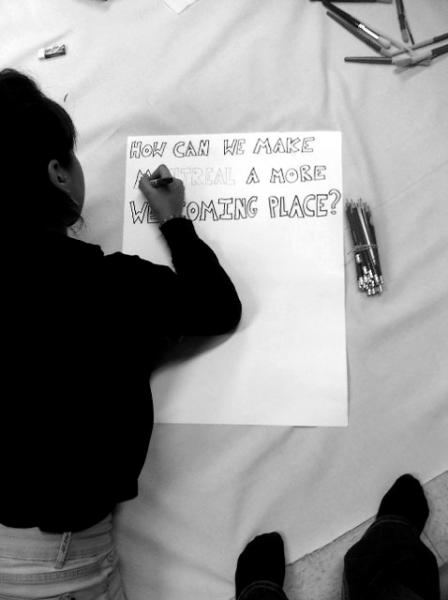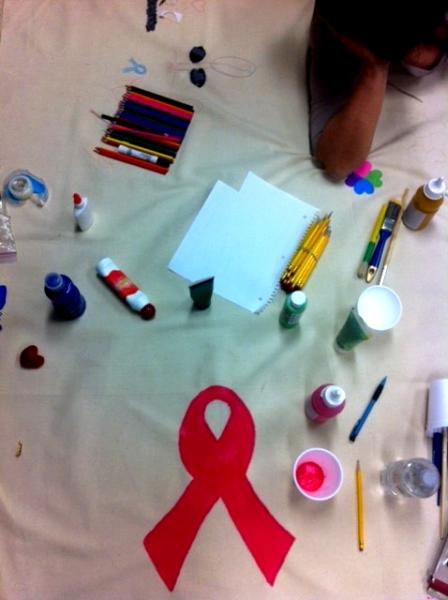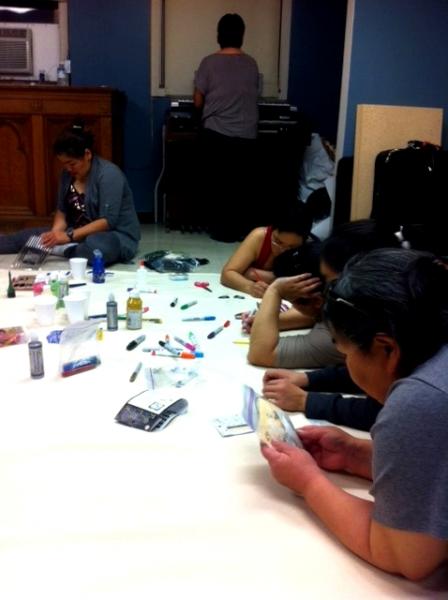Submitted by admin on
Tunngasugitsi signifie « bienvenue » en Inuktitut.
Un thème qui est au centre de la nouvelle série d’ateliers que idAction vient d’entamer avec les Inuit au Module du Nord Québécois (MNQ).
Qu’est-ce que le MNQ? Cette structure répond à un mandat régional pour les communautés du Nunavik en fournissant des services de liaison entre les établissements de santé du Réseau Universitaire Intégré de Santé (RUIS) McGill de Montréal et du Nunavik.
Ils sont plusieurs milliers par année à devoir se déplacer vers Montréal afin d’accéder à des soins médicaux de pointe qui ne sont pas accessibles dans les hôpitaux du Nunavik. Des enfants, adolescents, adultes, et aînés séjournent ainsi aux résidences du YMCA de Westmount (qui accueille le MNQ), pour des périodes d’une semaine à plusieurs mois. Les 142 lits de la résidence sont occupés en permanence. Certains de ces visiteurs sont à l’aise à Montréal, ils connaissent la ville et profitent de ses attraits et ressources pendant leurs séjours. Mais pour plusieurs autres, c’est aussi une source de stress lié entre autres à la méconnaissance de la ville, et le contact avec des influences négatives malheureusement présentes dans le secteur du YMCA. De plus, il y a beaucoup de temps libres à combler parmi les résidents, nous a-t-on dit au MNQ. Exeko s’y est donc taillé une petite place les mardi soirs afin de voir ce qui s’y passe, et ce qu’on pourrait y faire avec les résidents.
Comment vit-on un séjour au MNQ? Se sent-on chez soi? Au fait, qu’est-ce qu’un chez soi? Les Inuit du MNQ se sentent-ils les bienvenus à Montréal? Peut-on se sentir chez soi dans ce contexte de séjour? Oui, non, peut-être? Si non, comment faire pour rendre Montréal un endroit plus accueillant pour les Inuit en visite médicale? Voilà les questions de départ que l’équipe de médiateurs d’Exeko et les participants ont explorées au cours des deux premiers ateliers.

© Exeko
Les objectifs de ces ateliers sont de favoriser un espace de réflexion, de discussion, de créativité et de socialisation positive entre les participants, autour du thème du chez soi à Montréal. Découvrir la ville autrement, apprendre et échanger avec les diverses cultures qui s’y déploient. Partager des trucs et astuces sur la vie urbaine, comme les meilleures adresses pour des services et ressources qui répondent aux besoins de chacun.
Des exemples? Où trouver de la fourrure pour terminer de coudre une paire de mitaines? Où se procurer du fil et des perles pour faire des bijoux? Comment sortir du centre-ville et se rendre facilement dans un espace calme, un rivage de préférence, afin de relaxer et respirer un peu d’air frais? Suggestion d’une participante: pourquoi ne pas faire une carte de Montréal interactive où les résidents du MNQ pourraient partager leurs adresses utiles à Montréal?

© Exeko
Une autre suggestion lancée spontanément par un participant, après notre brève présentation sur la médiation culturelle : organiser des rencontres et échanges culturels avec les résidents non-Inuit du YMCA. Le YMCA accueille aussi des immigrants et réfugiés venant d’Afrique, du Moyen Orient, d’Haïti, … et certains Inuit aimeraient bien leur enseigner quelques trucs pour se garder au chaud l’hiver, notamment comment confectionner soi-même de bons vêtements d’extérieur. Aussi, l’idée a été lancée parmi les participants de partager des recettes de cuisson de pain traditionnel: la bannique inuite vs. les autres types de pains traditionnels des gens qui passent par le YMCA. Et pourquoi pas des ateliers de musiques originaires de chaque pays et régions?

© Exeko
Fructueuses, ces premières rencontres exploratoires! Alors pour débuter, nous avons convenu de créer une murale de bienvenue inclusive, sur de la toile de type ‘canvas’ - le matériau avec lequel les Inuit fabriquent leurs tentes pour camper sur le territoire l’été. Tant qu’à parler de se bâtir un chez-soi, autant débuter avec le matériel approprié! Et de fait, cette toile en tissu a déjà su attirer l’attention et l’intérêt d’un premier groupe de participants Inuit, venus s’y exprimer d’une façon créative, y apposer un mot de bienvenu et de petits trucs pour leurs pairs du Nunavik, afin passer un bon séjour au MNQ.
La réalisation de cette murale se poursuivra au cours des ateliers, jusqu’en février 2015. Et autour de cette création, nous continuerons nos discussions, réflexions et développement de nouveaux ateliers avec les participants.









 Laurier
Laurier